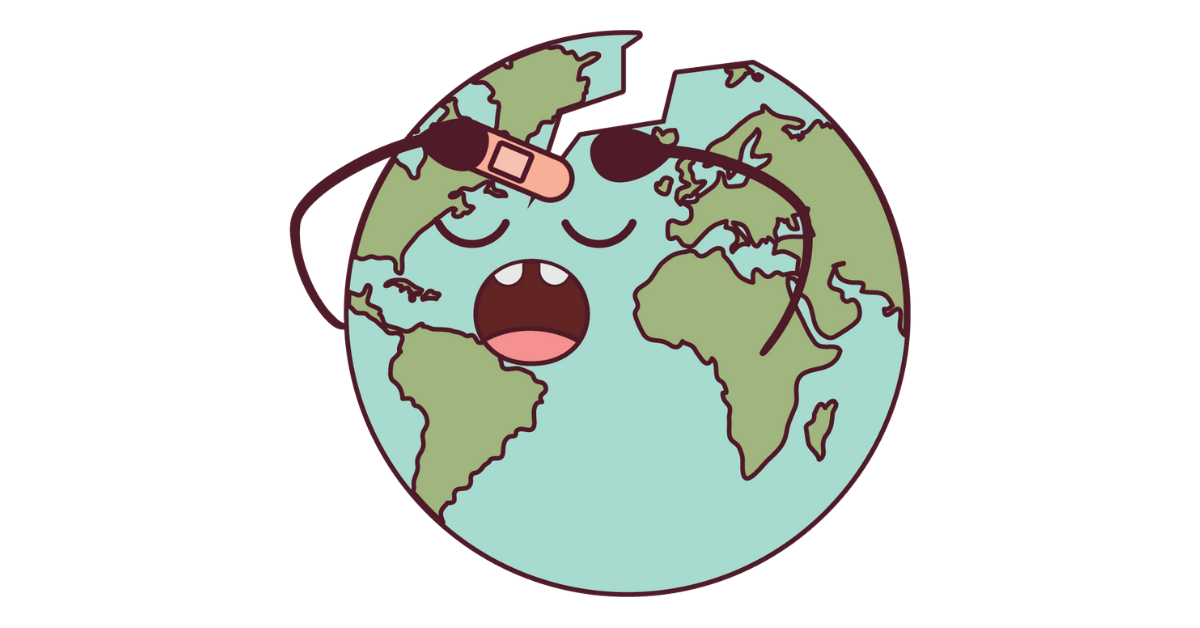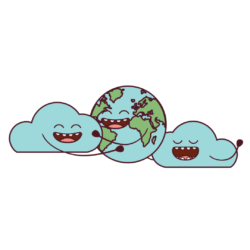March 11, 2021

The Earth Is Sicker, and So Are We: Environmental Change and Worsening Health
“Evolution had left humans ill-suited for their modern environment.” —Barton Child, MD
The environment has a profound effect on our health and well-being. Massachusetts General Hospital Chief of Medicine Dr. Alexander Leaf published an article thirty years ago in the New England Journal of Medicine: Potential Health Effects of Global Climatic and Environmental Changes. The concerns it outlines are even more relevant today. [1]
In that article, John Hopkins pediatrician Barton Childs’ remarks “that evolution had left humans ill-suited for their modern environment and that physicians should first focus on environmental and lifestyle factors, turning to medicines or surgery only as a last resort.”
Over eons, human evolution created hunters-gatherers who could survive harsh conditions including calorie restriction, prolonged physical activity, and social deprivation. Fast forward to modern times. With an overabundance of high calorie food, profound physical inactivity, and excess social media — we have a society fraught with iatrogenic, self-induced, disease.
Despite debate and politicization, scientists have methodically documented global environmental change for decades. Even in 1989, some scientific circles recognized the concept of “Planetary health.” While the term is antiquated, even quaint, its proponents outlined the need for a “reconfiguration of transportation, housing, agriculture, energy, and medicine to sustain the planet’s natural systems and the health of humans and other species,” to achieve Planetary Health. [1]
While the world is currently focused on COVID-19, climate change continues, building a longer, more persistent, and ultimately more virulent threat. Sudden changes such as pandemics catch our attention, whereas we tend to ignore slower moving trends like global warming. For long-term survival, the world must overcome the tyranny of the present and address the threats on the future.
We must address the current climate crisis for our individual health, but also as a cost-effective strategy to move large populations toward better health and wellness. Interestingly, the cause-and-effect solution works both ways: improving the environment will help wellness, while improving wellness will help the environment. Nutrition, occupational health, and infectious disease prevention — scientific fields that now have scientifically accepted ways to improve society — intersect with environmental health and epidemiology.
Climate Change: Yes, It’s Our Fault.
The facts of climate change are well-founded, despite debate fueled by politics and perhaps exacerbated by outside nefarious influences. August 2018 was the 406th straight month of global mean temperatures higher than the long-term mean. [2] The change in global mean temperature has accelerated since 1970 due primarily to greenhouse gases. Carbon dioxide is the prominent culprit and has almost doubled since preindustrial times. Methane and black carbon also contribute to the deleterious trend.
Warmer air holds more moisture, subsequently changing precipitation patterns. Eastern United States has experienced a 27% increase in rain and snow fall since 1901, whereas the western United States remains more stable in total precipitation. Regional prolonged drought by the end of century is a realistic fear because of uneven patterns.
Greenhouse-gas emissions ultimately result in extreme climate changes including heat waves, floods, droughts, and sea level rise. The unfortunate melting of Antarctic ice and Greenland’s ice cap will have serious consequences along coastal regions in the rest of the world.
Anthropogenic climate change, namely changes caused by humans, quintupled the risk of extreme vapor-pressure deficits, commonly known as low humidity. This dry air contributed to unprecedented destructive wildfires in California, Oregon, British Columbia, Brazil, and Australia in just the last few years. These large fires across the globe compound negatively, leading to further potential extensive fires as accelerating wind speeds exacerbate already-dry conditions. Fires release more carbon dioxide, further hastening harmful global warming. In addition to tragic loss of life and extensive property damage, air-pollution increased ten-fold, exacerbating lung disease. [3]
Interestingly, the American Meteorological Society’s assessments of human influences on climate highlights include record global heat, high-latitude marine heat (namely, Alaska is in hot water), extreme heat over Asia, and most recently record cold in Texas. The extremes have no signs of abating.
Climate Change: It’s Real. Real Bad. It Hurts.
Climate change causes both death and disease. Globally, estimates name air pollution as the cause of 6.5 million premature deaths annually. The primary, consistent contributor to air pollution is fine, particulate air pollution resulting from the use of fossil fuel for automobiles, power production, and industry. [4]
 Climate change, which directly affects temperatures, indirectly influences vector-borne diseases such as malaria, dengue, childhood stunting, and diarrheal diseases. [5] Climate change also adversely affects mental health with increased risk of depression and anxiety in people who have experienced extreme events such as floods, hurricanes, and blizzards.
Climate change, which directly affects temperatures, indirectly influences vector-borne diseases such as malaria, dengue, childhood stunting, and diarrheal diseases. [5] Climate change also adversely affects mental health with increased risk of depression and anxiety in people who have experienced extreme events such as floods, hurricanes, and blizzards.
Anthropogenic climate change also challenges the farming industry, thus harming food supply. Extreme weather reduces the yield of vegetables and lowers both protein and vitamins in major cereal crops, rice, and wheat. [6]
Climate deterioration forces intense pressure on individual and population health. Poor air quality, malnutrition from reduced food quality and/or security, vector borne diseases, and heat related illnesses are the more common consequences from changes in the environment.
Socioeconomically disadvantaged and minority populations are especially vulnerable to even one small additional challenge, let alone a crisis like the COVID-19 pandemic. Existing and worsening climate change will overly affect already stressed regions. Many already have weak infrastructure devastated by weather events, and a lack of resources to rebuild homes and businesses.
Prevention: Healthy Habits That Can Help Us All
Prevention of climate change requires a fundamental shift, a restructuring to address how everyone interacts with his/her environment. We need a worldwide response.
Five areas around the world, now joined by fifty-six communities in America, are already moving down a good path through individual behaviors. In these Blue Zones regions, people share nine characteristics: moving naturally, downshifting, having purpose, consuming a plant-slant diet, eating until 80% full, imbibing alcohol modestly, enjoying friends, having family interaction, and participating in a faith-based organization.

Healthier habits like these lower the risk for heart disease, stroke, and some types of cancer, and lower the mortality rates from all causes. [7]
Improving wellness decreases healthcare costs, thereby affording an opportunity to redirect health dollars to the environment.
The food system is a major driver of climate change. Animal-sourced foods have a higher impact on the environment than plant-based foods. If high income regions switch to a plant-based diet, that switch can reduce greenhouse gas emissions by 20 to 30%. [8] Thus, a plant-slant diet has global impact in addition to individual benefits.
Long-term, healthier people will have a greater opportunity to address the environment because they live longer and without suffering self-inflicted illness. Typically, folks who take good care of themselves attract other healthy folks, forming groups who can focus their energies on the environment rather than short-term survival. Living longer encourages and promotes attention to long-term goals such as reversing climate change.
4sight Health contributors recognize that we can’t fix the broken U.S. healthcare system without reducing the causal negative social determinants of health. Here are some 4sight Health articles with different perspectives on this issue.
- Public Health and Healthcare in Post-COVID America: Innovative Solutions for a Healthier, More Prosperous Society
By David Johnson, Court H. Houseworth, Kyle Stern - America’s Frayed Safety Net Undermines Improved Primary Care
By Merrill Goozner - Pandemics Cubed: Social Injustice and Chronic Disease Amplify COVID-19’s Virulence
By Allen Weiss
Sources
- “Potential Health Effects of Global Climatic and Environmental Changes,” by Alexander Leaf, New England Journal of Medicine, December 1989.
- “The Imperative for Climate Action to Protect Health,” by Andy Haines and Kristie Ebi, NEJM, January 2019.
- “Wildfires, Global Climate Change, and Human Health,” by Rongbin Xu, Pei Yu, Michael Abramson, Fay Johnston, Jonathan Samet, Michelle Bell, Andy Haines, Kristie Ebi, Shanshan Li, and Yuming Guo, NEJM, November 2020.
- “Air Pollution and Mortality in the Medicare Population,” by Qian Di, Yan Wang, Antonella Zanobetti, Yun Wang, Petros Koutrakis, Christine Choirat, Francesca Dominici, Joel D. Schwartz, NEJM, June 2017.
- “Quantitative risk assessment of the effects of climate change on selected causes of death,” 2030s and 2050s by WHO, 2014.
- “Global and regional health effects of future food production under climate change: a modelling study,” by Marco Springmann, Daniel Mason-D’Croz, Sherman Robinson, Tara Garnett, H Charles J Godfray, Douglas Gollin, Lancet, March 2016.
- “Health Effects of Adopting Low Greenhouse Gas Emissions Diets in the UK,” by J. Milner, R. Green, AD Dangour, British Medical Journal, 2015.
- “The Impacts of Dietary Change on Greenhouse Gas Emissions, Land Use, Water Use, and Health: a Systemic Review,” by L. Aleksandrowicz, R. Green, EJ Joy, P. Smith, A. Haines, PLoS, 2016.





